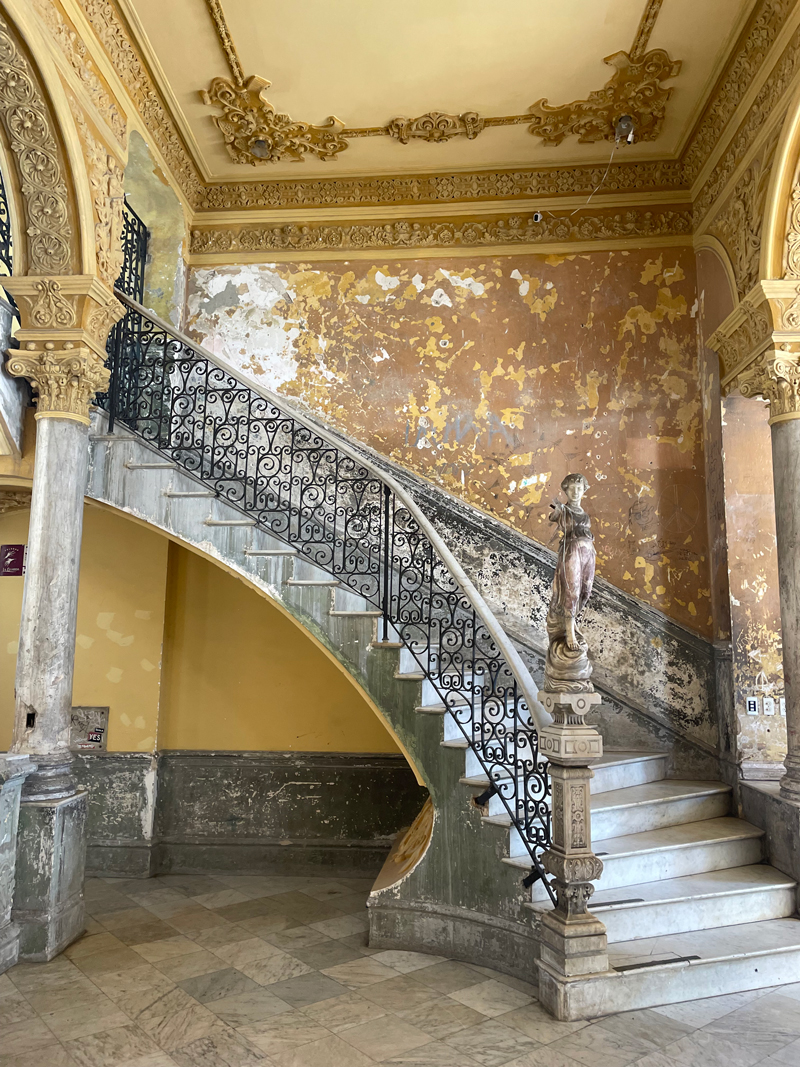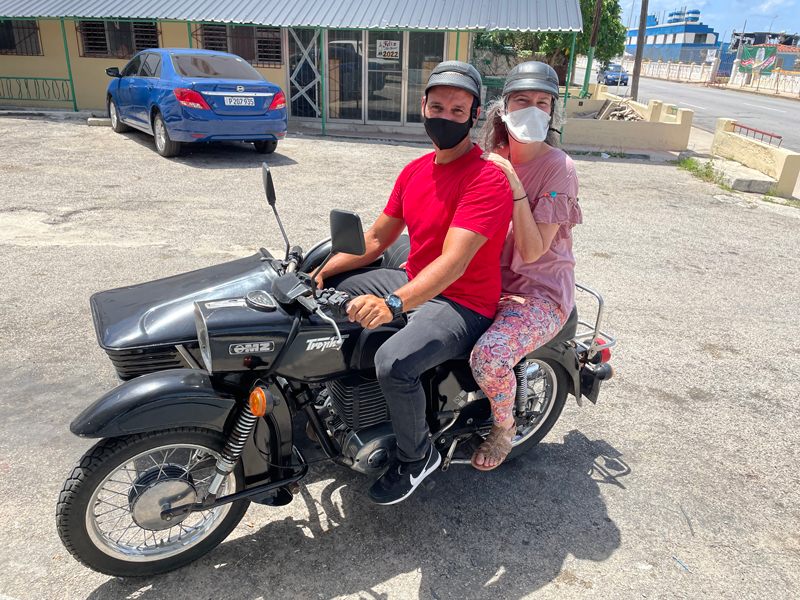The Holbrook Explorer

Back from the Field: Andrea Holbrook Returns from Cuba with an Eye Toward Future Travel
Back from the Field: Andrea Holbrook Returns from Cuba with an Eye Toward Future Travel
Andrea Holbrook recently returned from Cuba from a reconnaissance trip, or “Reccy,” to assess the readiness of Cuba to accept U.S. travelers again. She found it surprisingly accessible and the people extremely receptive. While impacted by the COVID slowdown and sanctions from the U.S., the country is once again open and accessible for visitors. According to Andrea, the resilient Cubans are eager to welcome U.S. travelers now and the country offers an unparalleled educational experience.
 Havana
Havana
Q: Is it legal for U.S. citizens to go to Cuba now?
Andrea: Absolutely. There are so many misunderstandings about travel to Cuba, and one is that people don’t realize it’s perfectly legal. There are 12 ways to travel to Cuba. The one that applies to most of the travel that Holbrook organizes is called “Support for the Cuban People.” This license is designed to promote and support private enterprise in Cuba. Complying with those license requirements usually means utilizing private accommodations, private restaurants, and frequenting private business as much as possible, all which is easy to do and also a wonderful way to visit Cuba.
Q: What is a “Reccy” and what were your objectives on this trip to Cuba?
Andrea: A “Reccy” is short for reconnaissance, and it’s really just assessing the situation in the field for a variety of purposes. It's part of our product development process. It’s so important to do our homework and be intimately familiar with what we are representing. Since no one from our home office had visited Cuba since the pandemic, we wanted to assess how the situation has changed in the last few years. So that was my main reason for going as well as to ensure that everything was in place for our first group’s arrival.
Q: Were there any changes or challenges to flying to Cuba?
Andrea: No. It's remarkably straightforward. There are daily flights from cities like Miami, Tampa, and Orlando on carriers like American, Southwest, JetBlue, and others who fly to Cuba. The only difference is that it is no longer possible to fly direct into secondary cities; the flights are all to and from Havana. And in terms of the license, it's simply a form that is filled out either while you're purchasing your ticket or while you're checking in.
Q: Since you last went to Cuba in 2019, what did you notice had changed? What did not change?
Andrea: We all know the effect of the global pandemic, and my concern was for my many friends and associates in Cuba and how they have survived the austerity. They have had economic hardships that preceded the pandemic, so I was very concerned about shortages and changes that I was going to confront. Yet in terms of the traveler experience, I'm not sure that the experience is dramatically different. Any traveler to Cuba for the first time sees the incredible adversity that the Cuban people face in their daily lives. What hasn’t changed is the incredible resilience and competence of the Cuban people in facing those challenges. The biggest change that I noticed from a de facto perspective is the currency. Right now, dollars are no longer officially accepted, so items need to be paid in the Cuban peso. The result is a minor inconvenience for U.S. travelers. For Cubans, it makes their daily life more difficult.
Q: Holbrook is known for its in-depth educational experiences; how does Cuba follow this model?
Andrea: Cuba has been an important destination for us since we started going there back in 2000. I always think that Cuba is a profoundly provocative destination. It is something that will shake you to your core. It is a place that I never tire of going, because it's such a paradox and such a contrast. It’s only 90 miles from Key West, but it’s a world away in so many ways. It’s the inverse of our country, and it’s hard to overstate the educational experience there. The Cuban people are very knowledgeable about the United States and are very sophisticated. Most of them have family in the United States. Yet we know so little about Cuba, and there's so much to learn from Cuba. It is a fascinating country and, from a nature perspective, it's very untouched and pristine. One of the things that makes Cuba so attractive for the natural history traveler is just the lack of development and the ability to see nature, in many cases, in a pristine state. For instance, many people comment on the old American cars that are so fun to see still running. I’ve heard that the coral reefs have been likened to those cars. In other words, you can see reefs there in their pristine state that parallel those cars from the 1950s – undisturbed. So it's just an amazing opportunity, and the people are fascinating, so it is a great educational experience.
 The staircase of La Guarida restaurant, one of the most well-known paladares or private restaurants in Havana
The staircase of La Guarida restaurant, one of the most well-known paladares or private restaurants in Havana
Q: What about accommodations in Cuba? Where do people stay since government-owned hotels are still not allowed?
Andrea: Because Cuba is a communist country, the government has some ownership stake in all the properties. No hotel is 100% privately owned, and for that reason, generally speaking, all hotels are currently off limits to U.S. citizens. That means people traveling to Cuba will be staying in casas particulares or private homes. We're all familiar with this concept with the wild popularity of Airbnb and Vrbo. In some cases, those homes are inhabited by Cuban families but most are not inhabited but have the benefit of having staff there at all times to assist you as needed. They simply don't live on the premises. The casas are really comfortable. I want to make sure people understand that there’s no luxury with them, but certainly you have air conditioning, even internet, and all of the necessary amenities for comfort. In Havana, some casas are even verging on “high end.” When you get into the provinces, they are a bit more rustic but still with air conditioning, private bath, and all the privacy that you need. Casas work well with our smaller groups of 10 to 12 people, typically. They provide a really wonderful way to visit the country, and we're excited about this.
 Casa Brava
Casa Brava
 La Villa Teresa
La Villa Teresa
 Las Brigidinas
Las Brigidinas
Q: Were there any memorable experiences for you on this visit? Anything that you want to share?
Andrea: Yes, I was welcomed into the home of Maikel Cañizares Morera, an ornithologist and conservationist of Cuban biodiversity, and Lucía Hechavarría-Schwesinger, a very talented Cuban botanist with the Instituto de Ecología y Sistemática (IES). We had such a wonderful visit. I was amazed at the way they had set up this amazing bird feeder in their fifth floor apartment in Havana, and they were providing sanctuary for Ruby-throated Hummingbirds and other birds in this urban environment with wonder and delight. They said that they had started a trend in their neighborhood, and a lot of people were doing this. I met their son who's rapidly becoming a published author in Cuba.
 Andrea with Maikel Cañizares Morera, Lucía Hechavarría-Schwesinger, and their son at their apartment in Havana
Andrea with Maikel Cañizares Morera, Lucía Hechavarría-Schwesinger, and their son at their apartment in Havana
Getting to their place and back was also a memorable experience. I got to ride with our guide, Atila Pérez, in his sidecar motorcycle. On our return, it was raining, and he can drive in the rain, so we would drive a little bit and then when it started to really pour, we would pull over under a tree. And then it would stop and start again, so we laughed and had a lot of fun.
 Andrea and Atila Pérez in his sidecar motorcycle
Andrea and Atila Pérez in his sidecar motorcycle
Q: Why do you think organizations or travelers should consider Cuba now?
Andrea: I think that as soon as you can go, it's a good time to go. There was almost nobody there from the United States. People are so welcoming and ready to receive visitors. Your access to people like Lucía and Maikel is really unprecedented. In another couple of years, their calendars will surely be busy with many, many visitors and travelers. In short, it’s open, it's legal, there’s almost nobody there, and you are having this unprecedented contact.
Q: How safe is traveling to Cuba?
Andrea: Cuba has a unique situation in terms of safety and security. First, Cuba has a tremendous biomedical industry, one reason why the country is over 90% vaccinated. There is excellent health care. As a tourist, you should feel very safe since it is communist. Some of the crime and drug related, gang related crimes that affect other Latin American countries are just not an issue in Cuba.
Q: What about small groups or private travelers?
Andrea: Now is ideal for small groups of travelers, individuals or small groups up to six people. Experts are accessible and available, and so we can put together programs for smaller parties that are just unparalleled opportunities to travel and really just kind of have it as you wish. When you sum up the value of the experience, it becomes very affordable and more accessible.
An example is this young entrepreneur, Kizzy Camejo Torres, who has a growing tourism business with private homes. Her tour, “A day as a Cuban,” is a glimpse of daily life – buying groceries, cooking a meal at home, and hanging out with a Cuban family – an amazing experience.
 Andrea and Kizzy Camejo Torres
Andrea and Kizzy Camejo Torres
